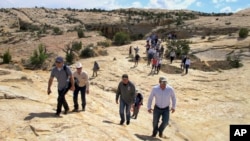Interior Secretary Ryan Zinke on Monday recommended that the new Bears Ears National Monument in Utah be reduced in size and said Congress should step in to designate how selected areas of the 1.3 million-acre site are managed.
Zinke made the recommendation as part of an interim report to President Donald Trump on the scenic swath of southern Utah with red rock plateaus, cliffs and canyons on land considered sacred to tribes.
Trump signed an executive order in April directing Zinke to review the designation of dozens of national monuments on federal lands, calling the protection efforts “a massive federal land grab” by previous administrations.
Trump and other Republicans have singled out former President Barack Obama's designation of Bears Ears, calling it an unnecessary layer of federal control that hurts local economies by closing the area to new energy development. They also say it isn't the best way to protect the land.
Zinke toured Bears Ears last month on foot, horseback and helicopter and met with Utah Gov. Gary Herbert and other state leaders. Herbert and other Utah Republicans oppose Obama's December designation of the Bears Ears monument.
“There is no doubt that it is drop-dead gorgeous country and that it merits some degree of protection, but designating a monument ... where multiple-use management is hindered or prohibited is not the best use of the land and is not in accordance with the intention of the Antiquities Act,” Zinke said.
Zinke did not specify how much of the 1.3 million acres should be trimmed, but said he has no doubt the monument must be “right-sized” significantly.
Sen. Orrin Hatch, R-Utah, called Zinke's announcement “an unquestionable victory for Utah” and said reducing the monument's footprint was in line with the intent of the 1906 Antiquities Act, which states that monument designations should be the “smallest area compatible” with proper care and management of the site.
Zinke, a former Republican congressman from Montana, said he wants to make sure Native American culture is preserved and said Congress should approve legislation granting tribes legal authority to “co-manage” some of the Bears Ears site.
“I have enormous respect for tribes,” he said.
But several tribal leaders who worked to win the monument designation bashed Zinke's decision, vowing legal action if Trump accepts the recommendation to downsize the monument.
Zinke's proposal to allow co-management rights for tribes - an action that would require congressional approval - does not ease their anger, tribal leaders said.
“Bears Ears is not for sale. It's not up for trade,” said Natalie Landreth, a lawyer for the Native American Rights Fund.
Ethel Branch, Navajo Nation Attorney General, called Bears Ears a holy land that contains “critical plants, minerals and powers” that numerous tribes rely on to heal and strengthen themselves.
“Protection of these lands is non-negotiable,” she said.
Environmental groups also blasted the recommendation, which they said threatened the future of Bears Ears and boded poorly for a broader review of national monuments due in August.
“The Trump administration's announcement today on Bears Ears is nothing less than an attack on the future of all American monuments, parks and public lands,” said Jamie Williams, president of The Wilderness Society. The recommendation ignores thousands of public comments in favor of the monument and makes “a mockery of the claimed public process,” Williams said.
Zinke said he will issue a final report in late August, when he is due to make recommendations on Bears Ears and 21 other national monuments on federal land in 11 states, including Grand Staircase-Escalante in Utah, Giant Sequoia in California, Nevada's Basin and Range and Katahdin Woods and Waters in Maine.
The review also targets five marine monuments in the Atlantic and Pacific Oceans.
Zinke rejected a plea by some Utah Republicans to recommend that the monument designation be rescinded entirely, an unprecedented step that would invite a near-certain legal challenge. Instead, Zinke said some of the sprawling, 1.3 million acre site should be designated for conservation or recreation, categories that are less restrictive than monuments.
Noting the contentious nature of the monument designation, Zinke called on Congress to approve a land-management bill for Bears Ears and other federal lands. The Republican-controlled Congress has failed to approve a significant public lands bill in recent years, but Zinke said that was because of veto threats by Obama.
He summed up his optimism in two words: “President Trump.”
